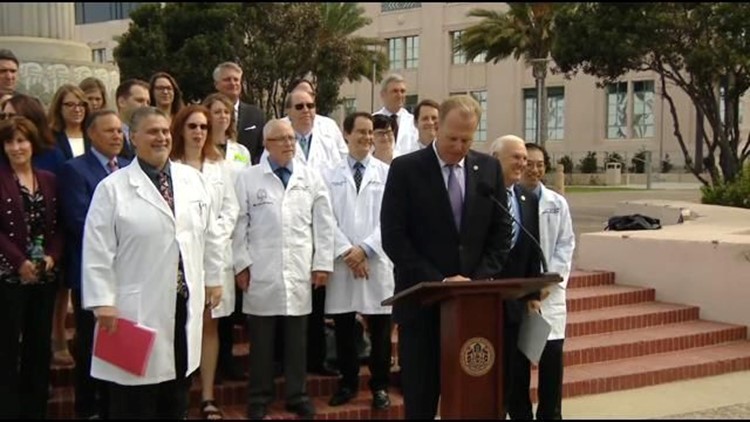SAN DIEGO (NEWS 8) - With the number of documented hepatitis A cases continuing to rise, Mayor Kevin Faulconer, San Diego County health officials and several civic leaders joined together Tuesday to kick off a “Vaccination, Sanitation and Education” campaign to urge the public to take appropriate precautions.
There are a number of opportunities available for people to get free hepatitis A vaccinations and sanitary kits. If someone is interested in a vaccine, they should call 211 or go to 211sandiego.org.
“Our county-lead health teams have been mobilized since March to deal with an unprecedented outbreak that is primarily impacting San Diego County’s homeless and substance abuse communities,” County Supervisor Ron Roberts said. “We need to continue our course of vaccination, sanitation and education efforts recommended by local, state and national public health officials and our own best practices.”
Health officials reminded the public that while the vast majority of people will fully recover from hepatitis A if contracted, people can take very simple steps to help avoid the virus altogether.
Officials say the most effective way to combat hepatitis A is for at-risk people to get vaccinated. At-risk populations include homeless individuals, intravenous drug users, food handlers, janitorial workers and occupations/professions that have regular interactions with at-risk people, such as police officers, firefighters, paramedics, homeless service providers and health care professionals.
“This is our community and we are working day and night to take care of it. It is going to require a sustained effort and everyone in San Diego County has a role to play,” Mayor Faulconer said. “Free hepatitis A vaccines are available thanks to the County of San Diego, American Medical Response and Downtown San Diego Partnership. San Diego is a healthy and safe community, and it will remain so as long as we follow the advice of our medical professionals.”
Hepatitis A is a highly contagious liver infection that is usually transmitted by the fecal-oral contact, either through person-to-person contact or consumption of contaminated food or water. Contamination can occur when infected persons do not wash their hands properly after going to the bathroom and then touch other objects or food items. Surfaces that are frequently touched should be cleaned and sanitized often.
To avoid infection, public health officials recommend people wash their hands regularly after using the bathroom and before preparing or eating food. Hands and arms should be washed with warm soapy water for at least 20 seconds and then thoroughly rinsed with clean running water and properly dried.
“There are precautions anyone can take to avoid getting hepatitis A,” said Dr. Nick Yphantides, Chief Medical Officer for the County Health and Human Services Agency (HHSA). “For those considered at-risk, they should get vaccinated. And all of us, whether we are considered at-risk or not, need to follow common sanitation habits, like washing hands with soap and warm water.”
According to the County HHSA, the majority of people who have contracted hepatitis A are either homeless, illicit drug users, or both. So far, no common sources of food, beverage or drugs have been identified as the source or contributing factor in the current outbreak.
Last week, workers hosed down sidewalks after an outbreak of Hepatitis A.
The virus has killed 16 people and sickened more than 400 in the County.
Customers who dined at the World Famous restaurant in Pacific Beach, on specific dates in late August-early September, were told to get vaccinated after potential exposure.
This is the second worst outbreak since the vaccine was introduced in 1995.
RELATED COVERAGE



